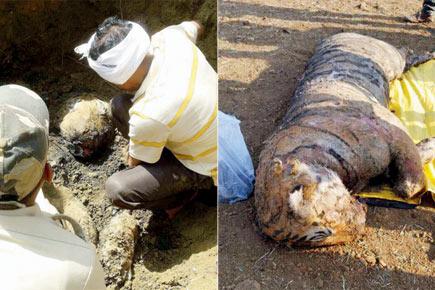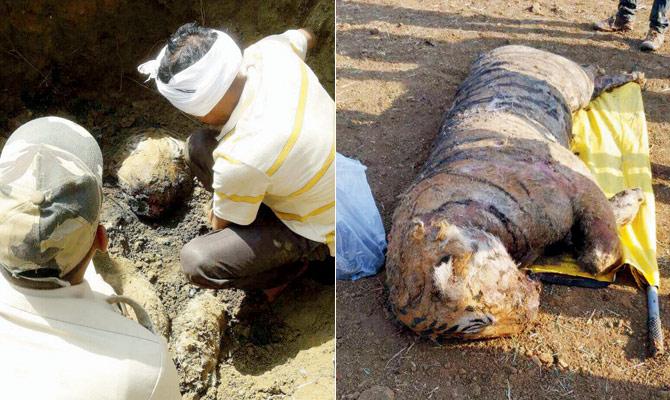Jai's son, sub-adult tiger Srinivas who had gone missing, has been found; his electrocuted body was recovered near the Nagbhid forest area. The forest department has arrested a farmer, Mahadev Baburao Erpate, responsible for the animal's death

Forest department officials managed to find Srinivas, ironically with the help of his fallen radio collar, which was found near a field from where his body was recovered. Pic Courtesy/Roheet Karoo

Forest department officials managed to find Srinivas, ironically with the help of his fallen radio collar, which was found near a field from where his body was recovered. Pic Courtesy/Roheet Karoo
ADVERTISEMENT
Jai's son, sub-adult tiger Srinivas who had gone missing, has been found; his electrocuted body was recovered near the Nagbhid forest area. The forest department has arrested a farmer, Mahadev Baburao Erpate, responsible for the animal's death.
Also read: Is tiger Srinivas following in dad Jai's paw prints?
While the field in which Srinivas was found belongs to Erpate, two other farmers, Shubham Uike and Uttam Mahadev Irpate, too, have been arrested, and investigations are on. Officials have ruled out poaching, saying all body parts were found intact.
Wildlife lovers, understandably, are livid. A section of the community has blamed researchers for not properly monitoring the tiger's activity and movement. Sources in the forest department, however, said it was the fallen radio collar that helped in zeroing in on the big cat's location.
Divided they stand
Principal chief conservator of forests Shree Bhagwan said, "It's an unfortunate incident. The tiger's body was found in an agricultural field. The farmer who it belongs to has admitted that the tiger got killed because of the electric fencing surrounding his farm."
Sources in the department said last morning it found Srinivas's scat near the field. "Our team then questioned the farmer; he has confessed... He said because he was afraid of getting caught, he removed the radio collar and buried the animal in a 5-ft-deep pit near the farm," said the officer.
The death has divided the wildlife fraternity. While one group blames the forest department and researchers for not tracking the tiger's movements properly, another says collaring does not guarantee the animal's protection.
Sarosh Lodhi from Conservation Lenses and Wildlife, an independent group of wildlife lovers and photographers, said, "One tiger is killed every fourth day; at this rate, we will lose our national animal sooner than we realise. Constantly torturing tigers by collaring and re-collaring is proving fatal to them. Apart from various instances, where collars have failed to work, this one goes to show that even after getting signals, the department couldn't do anything to avoid his death."
"Weaker laws, poor rate of conviction and punishments that don't deter people from committing wildlife crimes are the major reasons for so many deaths. Will we ever account for these deaths and the callous attitude of officers in charge?" he questioned.
Viral voice
After Srinivas's death, a post on it went viral via social networking sites and WhatsApp. It said, "The news and events leading to finding the dead tiger UKT10 are a big shock for all wildlife lovers. It brings out a lot of stark realities and facts to the fore, which have to be understood with an unprejudiced mind."
"Collaring or tagging any tiger does not guarantee the animal's immortality. It is a method to identify the behaviour and movement paths of a wild animal or bird. A collared animal is as much exposed to perils and dangers as an uncollared one. In the case of UKT10, the retrieved collar, which was emitting signals, actually led to investigations in the field, leading to the tiger and the culprit.
"Many big cats, especially tigers, would have met such a fate and gone undetected. Which brings us to the most important point. UKT10 was electrocuted outside the boundaries of a protected area. We know such areas as corridors that are not in the control of any wildlife division... Strengthening of corridors is and cannot be done by forest department alone. If we want to have a steady increase in tiger numbers, the forest department needs to be ably supported by NGOs, organisations, and to a large extent, villagers, and backed by the lawmakers of the land," it added.
Officialspeak
A senior forest department official said, "Why are wildlife lovers blaming the department when the electrocution happened 2 km from the protected forest at midnight on a farmland (which is not under the jurisdiction of the forest department)? Those targeting us should understand that we found and arrested the culprit. Radio-collaring a tiger does not ensure the animal's complete safety."
 Subscribe today by clicking the link and stay updated with the latest news!" Click here!
Subscribe today by clicking the link and stay updated with the latest news!" Click here!







